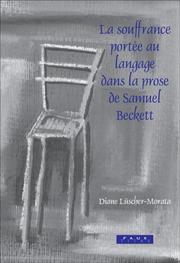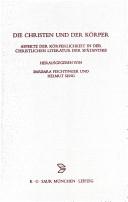| Listing 1 - 10 of 14 | << page >> |
Sort by
|
Book
ISBN: 3657788859 350678885X Year: 2018 Publisher: Paderborn Brill | Schöningh
Abstract | Keywords | Export | Availability | Bookmark
 Loading...
Loading...Choose an application
- Reference Manager
- EndNote
- RefWorks (Direct export to RefWorks)
Die Autorin untersucht die Herkunft des Bösen, vor allem bei Thomas von Aquin und Maimonides, und analysiert das Zusammenspiel der natürlichen Begrenztheit des Geschaffenen und der menschlichen Freiheit. Dabei setzt sie sich mit der Frage nach der Herkunft des Bösen auseinander, wobei sie ausgewählte Positionen der philosophischen Theodizeedebatte sowie biblische Texte für die Beantwortung der Frage nach dem Bösen hinzuzieht. Der Fokus der Untersuchung liegt auf den mittelalterlichen Positionen des Christen Thomas von Aquin und des Juden Moshe ben Maimon. Die große Stärke der beiden Theorien liegt in der Vermittlung zwischen göttlicher und menschlicher Verantwortung für das Böse, indem beide eine schöpfungs-theologische sowie eine anthropologisch-freiheitstheoretische Argumentationslinie verfolgen.
Book
ISBN: 3205777050 9783205777052 Year: 2008 Publisher: Wien : Böhlau,
Abstract | Keywords | Export | Availability | Bookmark
 Loading...
Loading...Choose an application
- Reference Manager
- EndNote
- RefWorks (Direct export to RefWorks)
Evolution. --- God. --- God. --- Human beings. --- Human beings. --- Leid. --- Mensch. --- Nature --- Nature --- Religion. --- Religion. --- Religious aspects. --- Religious aspects.

ISBN: 9042016477 9401201323 1423791622 9789042016477 9789401201322 9781423791621 Year: 2005 Volume: 266 Publisher: Amsterdam Rodopi
Abstract | Keywords | Export | Availability | Bookmark
 Loading...
Loading...Choose an application
- Reference Manager
- EndNote
- RefWorks (Direct export to RefWorks)
Après la guerre, une réorientation radicale intervient dans la prose de Samuel Beckett : ce changement a trait avant tout à la souffrance. Celle-ci va contaminer tous les aspects de l'expérience humaine. Beckett semble privilégier de plus en plus une histoire débordant les seuls cataclysmes du XXe siècle : l'histoire anonyme et silencieuse d'une humanité torturée depuis des temps immémoriaux et vouée à un sort incompréhensible. Cette lecture de l'œuvre beckettienne s'imprègne des études de Paul Ricœur sur l'identité et le souvenir et aborde la prose de Beckett comme une écriture de la mémoire. Ainsi Watt , dont la genèse est retracée au travers d'un examen des manuscrits, est considéré ici comme un paradigme dans l'écriture de la mémoire et de la souffrance. D'autre part, les 'German Diaries', écrits en 1936-7, témoignent de l'intérêt profond de Beckett pour la peinture. Cette étude se penche sur ses réflexions sur l'art et ses réactions face aux icônes religieuses dans le contexte de la souffrance. Les écrits de Ricœur permettent de mieux examiner la manière dont l'œuvre beckettienne se trouve de plus en plus au carrefour d'identités privées et plurielles. Au travers de ces études, la question de la disparition de l'individu, remplacée graduellement par une histoire de la souffrance collective, peut être réévaluée.
Book
ISBN: 3492007538 9783492007535 Year: 1985 Publisher: München Piper
Abstract | Keywords | Export | Availability | Bookmark
 Loading...
Loading...Choose an application
- Reference Manager
- EndNote
- RefWorks (Direct export to RefWorks)
216.5 --- Godsleer --- #GOSA:V.T.M --- #GOSA:I.OT.Job.M --- 216.5 Goed en kwaad: lijden --- Goed en kwaad: lijden --- Aufsatzsammlung. --- Leid. --- Theodizee. --- Ijob (Buch).
Book
Year: 1951 Volume: 1 Publisher: Bern : A. Francke,
Abstract | Keywords | Export | Availability | Bookmark
 Loading...
Loading...Choose an application
- Reference Manager
- EndNote
- RefWorks (Direct export to RefWorks)
Leid (The word) --- Court epic, German --- German language --- Epopée de cour allemande --- History and criticism --- Words --- History --- Histoire et critique
Book
ISBN: 3839419018 Year: 2014 Publisher: Bielefeld transcript Verlag
Abstract | Keywords | Export | Availability | Bookmark
 Loading...
Loading...Choose an application
- Reference Manager
- EndNote
- RefWorks (Direct export to RefWorks)
Gemäß einer Reihe von philosophischen Strömungen erschöpft sich das Subjekt im Vernünftigen - die Kunst hingegen überschreitet den Rahmen der Vernunft immer wieder. Existentielle Erfahrungen von Leid, Klage und Angst fließen hier in das Verständnis von Subjektivität ein. Durch eine Auseinandersetzung mit den Grenzen der Kunst, wie sie Winckelmann, Lessing und Hegel gesetzt haben, zeigt Diana König auch die Grenzen der Vernunft auf. Sie versteht Kunst als ständige Überschreitung, die sich an mehr als an die vernünftigen Fähigkeiten richtet. Das Subjekt bekommt hier noch eine andere Fähigkeit zugeschrieben: die der intuitiven Erkenntnis. Besprochen in: GERMANISTIK, 52/3-4 (2012)
Subjekt; Leid; Hegel; Lessing; Intuitive Erkenntnis; Kunst; Ästhetik; Deutsche Philosophiegeschichte; Kunsttheorie; Kunstwissenschaft; Philosophie; Arts; Aesthetics; German History of Philosophy; Theory of Art; Fine Arts; Philosophy --- Aesthetics. --- Fine Arts. --- German History of Philosophy. --- Philosophy. --- Theory of Art.
Book
ISBN: 9789004172470 9789047425946 Year: 2009 Volume: 12 Publisher: Leiden Brill
Abstract | Keywords | Export | Availability | Bookmark
 Loading...
Loading...Choose an application
- Reference Manager
- EndNote
- RefWorks (Direct export to RefWorks)
The early modern period is a particularly fascinating chapter in the history of pain. This volume investigates early modern constructions of physical pain from a variety of disciplines, including religious, legal and medical history, literary criticism, philosophy, and art history.
History of civilization --- anno 1600-1699 --- anno 1400-1499 --- anno 1500-1599 --- Pain --- Christianity --- Culture. --- History, 17th Century. --- History, Early Modern 1451-1600. --- Literature --- POLITICAL SCIENCE --- SOCIAL SCIENCE --- Pain. --- Leibesstrafe --- Folter --- Martyrium --- Gei�elung --- Schmerz. --- Leid --- History. --- Religious aspects --- Christianity. --- history. --- Public Policy --- Cultural Policy. --- Anthropology --- Cultural. --- Popular Culture. --- Europe. --- Leiden <2007> --- Leibesstrafe. --- Folter. --- Martyrium. --- Gei�elung. --- Leid. --- Leiden <2007>. --- History, 17th century. --- History, early modern 1451-1600. --- Political science --- Social science --- Public policy --- Cultural policy. --- Popular culture. --- History --- Aches --- Emotions --- Pleasure --- Senses and sensation --- Symptoms --- Analgesia --- Suffering --- Religious aspects&delete&
Book
ISBN: 9782745322456 2745322451 Year: 2012 Volume: 52 Publisher: Paris: Champion,
Abstract | Keywords | Export | Availability | Bookmark
 Loading...
Loading...Choose an application
- Reference Manager
- EndNote
- RefWorks (Direct export to RefWorks)
Poetry --- Fiction --- Old French literature --- anno 1100-1199 --- anno 1200-1299 --- Love in literature --- Courtly love. --- Literature, Medieval --- French literature --- Amour dans la littérature --- Amour courtois. --- Littérature médiévale --- Littérature française --- French literature. --- Literature, Medieval. --- Love in literature. --- Höfisches Epos. --- Versroman. --- Altfranzösisch. --- Liebe --- Leid --- Lyrisches Ich. --- History and criticism. --- History and criticism --- Histoire et critique. --- Histoire et critique --- To 1500.

ISBN: 3598777361 3110943719 Year: 2004 Volume: 184 Publisher: München Saur
Abstract | Keywords | Export | Availability | Bookmark
 Loading...
Loading...Choose an application
- Reference Manager
- EndNote
- RefWorks (Direct export to RefWorks)
Die Beiträge zur Altertumskunde enthalten Monographien, Sammelbände, Editionen, Übersetzungen und Kommentare zu Themen aus den Bereichen Klassische, Mittel- und Neulateinische Philologie, Alte Geschichte, Archäologie, Antike Philosophie sowie Nachwirken der Antike bis in die Neuzeit. Dadurch leistet die Reihe einen umfassenden Beitrag zur Erschließung klassischer Literatur und zur Forschung im gesamten Gebiet der Altertumswissenschaften.
Human body --- Church history --- Religious aspects --- Christianity --- History of doctrines --- 130.14 --- Wijsgerige antropologie: lichaam --- 130.14 Wijsgerige antropologie: lichaam --- Body, Human --- Human beings --- Body image --- Human anatomy --- Human physiology --- Mind and body --- Body [Human ] in literature --- Congresses --- Christian literature [Early ] --- History and criticism --- Frühchristentum. --- Körper. --- Leiblichkeit. --- Leid. --- Literatur. --- HISTORY / General. --- Christian literature --- Human body in literature. --- Body, Human, in literature --- Human figure in literature --- History and criticism. --- History of doctrines.
Book
ISBN: 1282400169 9786612400162 9047424352 9789047424352 9789004171046 9004171045 9781282400160 6612400161 Year: 2009 Publisher: Leiden Boston Brill
Abstract | Keywords | Export | Availability | Bookmark
 Loading...
Loading...Choose an application
- Reference Manager
- EndNote
- RefWorks (Direct export to RefWorks)
At the fiftieth anniversary of the Old Testament Society of South Africa a conference was organized on the theme Exile and Suffering. This volume contains a selection of the papers presented. Focal questions are such themes as: What do we really know about the Exile? To what degree did suffering take place? How did the Ancient Israelites cope with the disaster? Where the ancinet traditions sufficient to deal with the Exile? Or did this period produce new forms of 'theology'? The significance of the Exile as a matrix for understanding suffering until this day is also dealt with.
Exil (Motiv) --- Leid (Motiv) --- Theodizee (Motiv) --- Jews --- Suffering --- Affliction --- Masochism --- Pain --- Hebrews --- Israelites --- Jewish people --- Jewry --- Judaic people --- Judaists --- Ethnology --- Religious adherents --- Semites --- Judaism --- History --- Biblical teaching --- Altes Testament --- Bible. --- Antico Testamento --- Hebrew Bible --- Hebrew Scriptures --- Kitve-ḳodesh --- Miḳra --- Old Testament --- Palaia Diathēkē --- Pentateuch, Prophets, and Hagiographa --- Sean-Tiomna --- Stary Testament --- Tanakh --- Tawrāt --- Torah, Neviʼim, Ketuvim --- Torah, Neviʼim u-Khetuvim --- Velho Testamento --- Criticism, interpretation, etc. --- History of Biblical events
| Listing 1 - 10 of 14 | << page >> |
Sort by
|

 Search
Search Feedback
Feedback About UniCat
About UniCat  Help
Help News
News